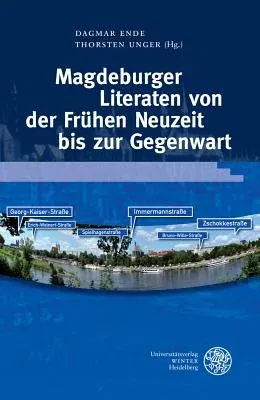English summary: This book shows that the city of Magdeburg, completely
destroyed in 1631, has consistently had cultural importance since the
end of the 17th century. The later Prussian fortification proved to be
fertile soil for cultural life, especially when the Prussian court
resided there in times of war and the wealth of the industrial city
promoted the cultural scene as well. Already in the 18th century there
were more literary societies and periodicals in the city, and a busy
theater life emerged whose peak was the German Theater Exhibition in
1927. The city also hosted important trans-regional centers such as the
School of Applied Arts and Crafts or the expressionistic artistic and
literary association called The Ball (Die Kugel). Thus, Magdeburg has
always attracted creative artists from other regions, while at the same
time being a birthplace or (with its tradition-rich schools) the
educational place of important writers. The contributions in this book
consider some of these artists such as Samuel Patzke, Stephan Schutze,
Heinrich Zschokke, Marie Nathusius, Carl Immermann, Friedrich
Spielhagen, Bruno Wille, Johannes Schlag, Georg Kaiser and others, and
recalls at the same time the important cultural institutions in the city
and region as well as their trans-regional importance. German
description: Der vorliegende Band zeigt, dass die 1631 vollig zerstorte
Stadt Magdeburg vom Ende des 17. Jahrhunderts an wieder kulturelle
Bedeutung erlangte. Die spatere Preussische Festung erwies sich als
guter Nahrboden fur kulturelles Leben, zumal der preussische Hof in
Kriegszeiten dort residierte. Auch der Reichtum der Industriestadt
beforderte die Kulturszene. Bereits im 18. Jahrhundert gab es in der
Stadt mehrere literarische Gesellschaften und Zeitschriften, und es
entstand eine rege Theaterszene - mit dem Hohepunkt der Deutschen
Theaterausstellung 1927. Zu nennen sind ausserdem uberregional wichtige
Zentren wie die Kunstgewerbe- und Handwerkerschule oder die
expressionistische Kunstler- und Literatenvereinigung "Die Kugel". So
zog Magdeburg immer wieder Kulturschaffende aus anderen Regionen an, wie
es zugleich Geburtsstadt oder (mit seinen traditionsreichen Gymnasien)
Bildungsstatte bedeutender Schriftsteller war. Die Beitrage widmen sich
einigen von ihnen: Samuel Patzke, Stephan Schutze und Heinrich Zschokke,
Marie Nathusius und Carl Immermann, Friedrich Spielhagen, Bruno Wille
und Johannes Schlaf, Georg Kaiser und anderen, und erinnern zugleich an
wichtige kulturelle Institutionen in Stadt und Region sowie an deren
uberregionale Bedeutung.

